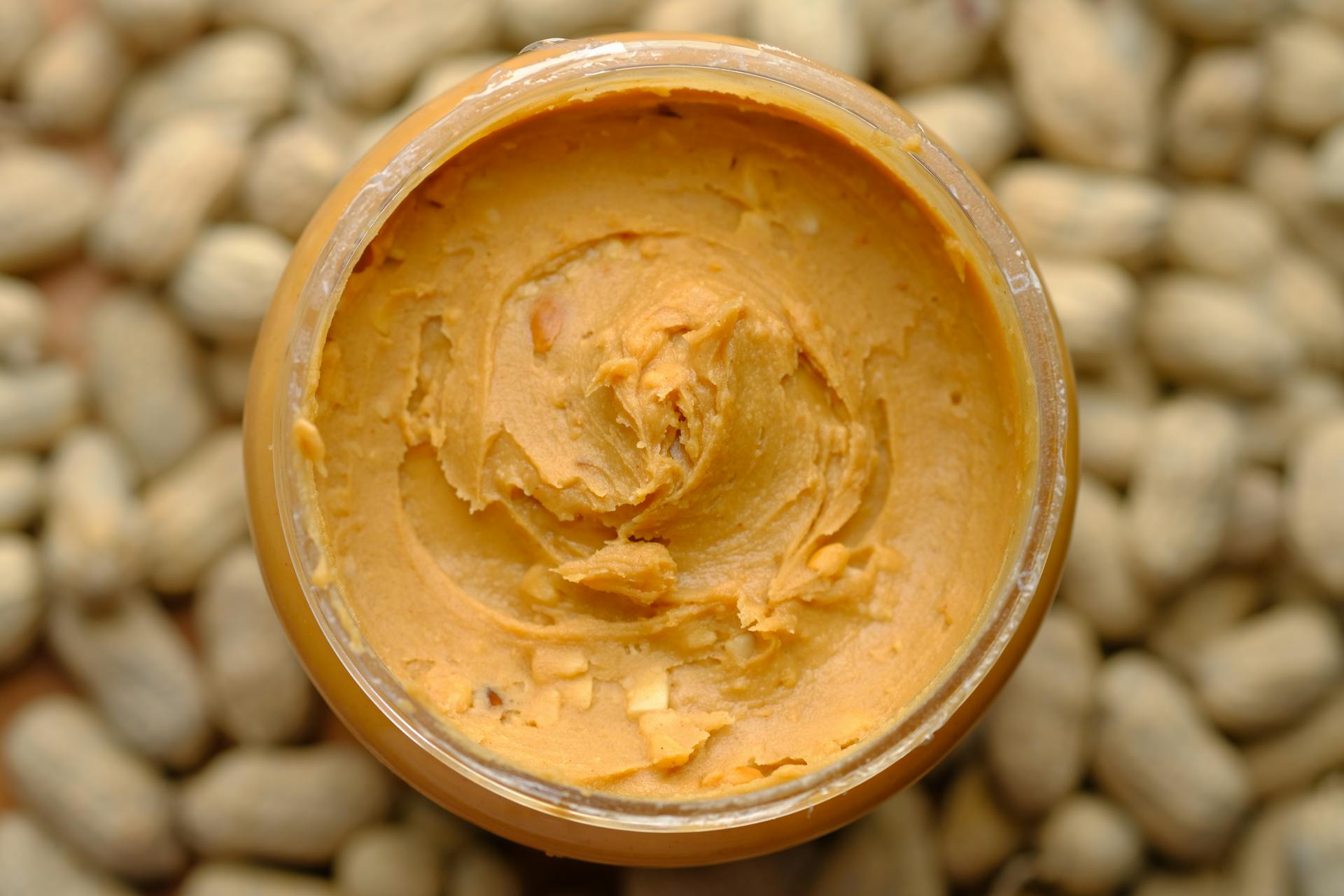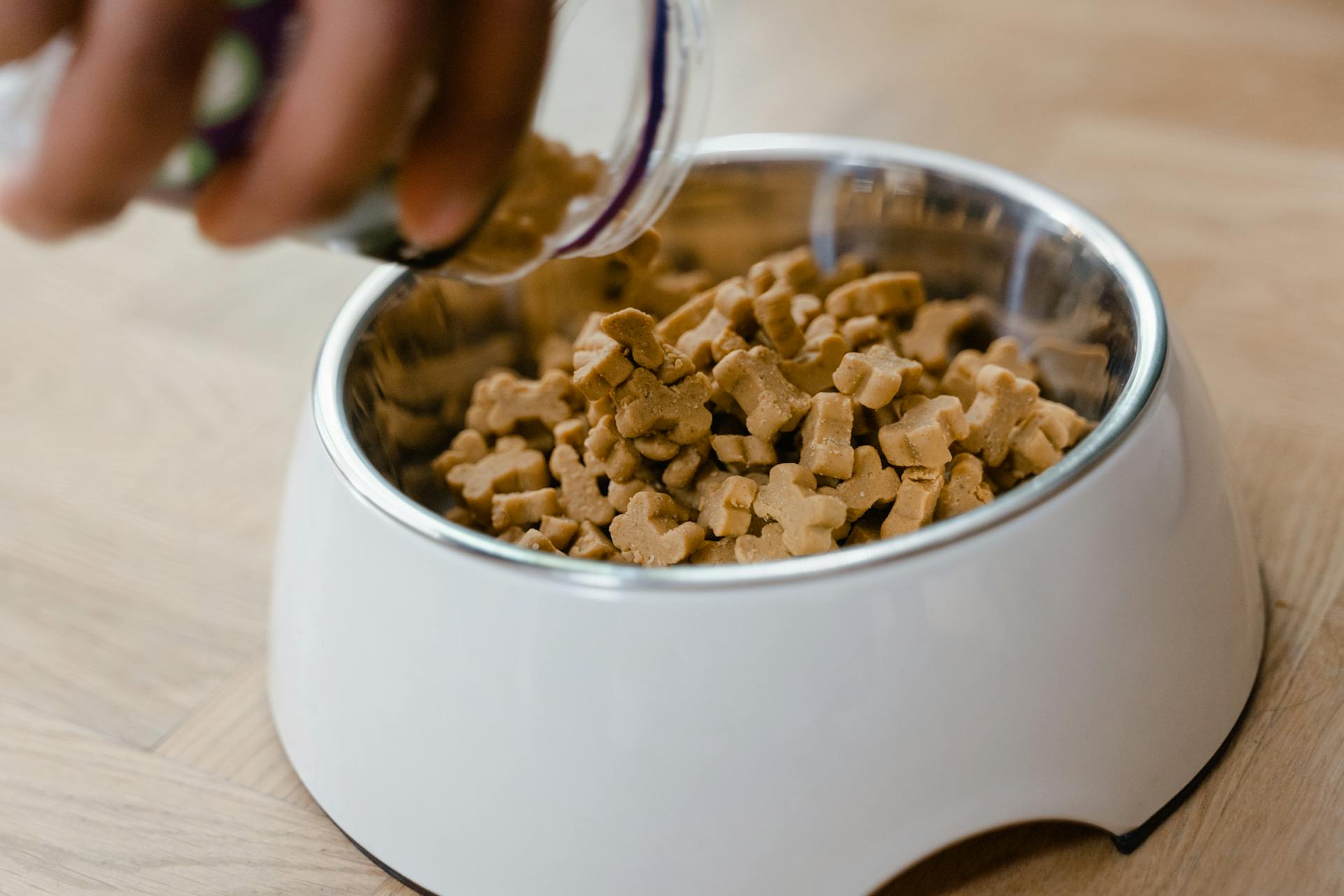
Baking soda can be toxic to dogs if ingested in large amounts, with a single teaspoon being enough to cause serious symptoms in a small dog.
Dogs can easily ingest baking soda by licking or eating it off surfaces, which is why it's essential to keep it out of reach.
Even small amounts of baking soda can cause stomach upset and vomiting in dogs, making it crucial to monitor your pet's behavior after exposure.
Baking soda can also cause electrolyte imbalances in dogs, which can lead to more severe complications if left untreated.
Consider reading: Small Dogs That like Water
Dog Safety
If your dog eats baking soda, alert your veterinarian right away, even if it's just a small amount. They'll be able to advise you on the best course of action. If your vet's office is closed, call a local emergency veterinary hospital or the Pet Poison Helpline (855-764-7661) – they're available 24/7, but be aware that a $75 incident fee applies.
You should not try to induce vomiting unless your veterinarian instructs you to do so, as this can cause more harm than good. Make sure your dog has access to plenty of fresh drinking water to stay hydrated.
Monitoring your dog's behavior closely is crucial, so keep a close eye on them for any signs of distress. Your veterinarian may recommend additional treatments, such as IV fluids and/or medications, depending on the amount of baking soda ingested.
What to Do If Your Dog Eats Something
If your dog eats something it shouldn't, stay calm and act quickly. If your dog has ingested a small amount of baking soda, they may just suffer from digestive upset, but keep an eye on them.
You should contact your veterinarian or an animal poison control hotline if your dog has eaten a significant amount of baking soda. They'll want to know how much baking soda your dog ate and when.
Monitor your dog's behavior closely and provide plenty of fresh drinking water. If your dog is experiencing vomiting, diarrhea, tremors, shortness of breath, lethargy, disorientation, or seizures, seek veterinary help immediately.
Here are some signs that require urgent veterinary attention:
- Vomiting
- Diarrhea
- Tremors
- Shortness of breath
- Lethargy
- Disorientation
- Seizures
If your vet's office is closed, call a local emergency veterinary hospital or the Pet Poison Helpline (855-764-7661), which is available 24/7.
What to Do If My Dog Eats
If your dog eats something toxic, it's essential to act fast. If your dog has ingested a significant amount of baking soda, contact your veterinarian or an animal poison control hotline right away.
You'll want to provide them with information on approximately how much baking soda your dog ate and at around what time. This will help them determine the best course of action.
If your dog has licked up a small amount of baking soda, they may suffer from digestive upset or a sore tummy. Keep an eye on them, as they may exhibit symptoms like vomiting, diarrhea, tremors, shortness of breath, lethargy, disorientation, or seizures.
Here are some common symptoms to watch out for:
- Vomiting
- Diarrhea
- Tremors
- Shortness of breath
- Lethargy
- Disorientation
- Seizures
If you can't get to a vet, consider using an online service like PangoVet, which offers affordable and personalized advice from a vet.
You might like: Vet Dogs Dog Treats
My Dog Ate Something - What to Do?
If your dog eats something they shouldn't, it's essential to stay calm and act quickly. If you suspect your dog has ingested baking soda, monitor their behavior closely for signs of illness.
If your dog has licked up a small amount of baking soda, they may suffer from digestive upset or a sore tummy. However, ingesting a larger amount can cause toxicosis.
Here are some common symptoms of baking soda toxicosis to watch out for:
- Vomiting
- Diarrhea
- Tremors
- Shortness of breath
- Lethargy
- Disorientation
- Seizures
If your dog has ingested a significant amount of baking soda, contact your veterinarian or an animal poison control hotline right away. They'll need to know approximately how much baking soda your dog ate and when.
If your vet's office is closed, you can call a local emergency veterinary hospital or the Pet Poison Helpline (855-764-7661). The Pet Poison Helpline is available 24/7, but a $75 incident fee applies.
Your veterinarian may recommend inducing vomiting or administering activated charcoal to prevent the compound from being absorbed into your dog's body. They may also want to perform additional treatments, such as IV fluids and/or medications.
Remember, don't induce vomiting unless instructed by your veterinarian. Make sure your dog has access to plenty of fresh drinking water and monitor their behavior closely.
Dogs and Water
Dogs and water go hand in paw, but it's essential to ensure they drink enough to stay healthy.
Dogs can go without water for up to 72 hours, but this doesn't mean they should.
Some dogs can swim, but it's crucial to teach them water safety to avoid accidents.
Dogs can get waterborne illnesses like Leptospirosis from contaminated water.
Dogs with certain medical conditions, such as kidney disease, may need to limit their water intake.
Dogs can become dehydrated quickly, especially in hot weather or during exercise.
Dogs should drink at least 1 ounce of water per pound of body weight daily.
Dogs can drink from a bowl or a water fountain, but some prefer the latter.
For another approach, see: How Long Can Dogs Be without Water
Dogs Eating Hazards
Dogs eating hazards are a real concern, and baking soda is one of them. Consuming large amounts of baking soda can lead to toxicosis, which can cause vomiting, diarrhea, tremors, shortness of breath, lethargy, disorientation, and seizures.
The amount of baking soda that can cause harm varies depending on your dog's size. For a small 11-pound dog, ingesting more than 3 tablespoons of baking soda can be toxic, while a 50-pound dog would need to ingest over 12 tablespoons before suffering from toxicosis.
If your dog has ingested baking soda, it's essential to monitor their behavior closely and keep an eye out for signs of digestive upset. Make sure your dog has access to plenty of fresh drinking water and consider contacting your veterinarian or an animal poison control hotline if you're concerned.
Here's a rough guide to help you estimate the amount of baking soda that's safe for your dog:
Is Toxic?
Baking soda is not strictly poisonous, but it can still cause problems for dogs that eat too much.
A small amount of baking soda is unlikely to do any harm, but a large amount can cause vomiting, abdominal pain, and even bloat.
Your dog's stomach is filled with acid, so it reacts with the baking soda they eat, leading to potential health issues.
Dogs Eating Hazards

Dogs eating hazards can be a real concern, and baking soda is one of them. Consuming too much baking soda can lead to toxicosis in dogs.
A small amount of baking soda, about 2-4 teaspoons per 1 kilogram of body weight, is unlikely to cause harm. However, a larger dose can cause digestive upset, vomiting, diarrhea, tremors, shortness of breath, lethargy, disorientation, and even seizures.
If your dog ingests a significant amount of baking soda, it's best to contact your veterinarian or an animal poison control hotline right away. This will help prevent further complications and ensure your dog receives proper treatment.
In fact, even if your dog only licks up a small amount of baking soda, it's still a good idea to keep an eye on them and monitor their behavior closely. This will help you catch any potential problems early on.
Here's a list of symptoms to watch out for if your dog has ingested baking soda:
- Vomiting
- Diarrhea
- Tremors
- Shortness of breath
- Lethargy
- Disorientation
- Seizures
If you're unsure about what to do, don't hesitate to reach out to your veterinarian or a local emergency veterinary hospital. They can provide you with guidance and help ensure your dog receives the care they need.
Frequently Asked Questions
Does baking soda and water help dogs paws?
Yes, baking soda and water can help soothe and clean your dog's paws, making it a great natural remedy for common paw issues. Mix 3 tbsp of baking soda with a cup of warm water for a simple and effective solution.
How to use baking soda in dog water for bad breath?
To help freshen your dog's breath, mix 1/2 teaspoon of salt and 1 teaspoon of baking soda in 1 cup of warm water for a daily mouth rinse. Regular use can help reduce tartar buildup and keep your pup's breath smelling its best.
Featured Images: pexels.com


